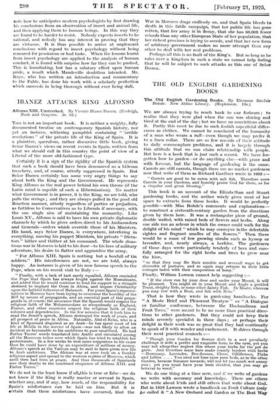IBANEZ ATTACKS KING ALFONSO
THIS is not an important book. It is neither a weighty, fully documented treatise on contemporary Spanish history, nor
yet an incisive, withering pamphlet containing " 'orrible revelations " of the private life of the King of Spain. It is a plaintive, querulous, rather discursive little book, giving Sefior Ibanez's views on recent events in Spain, written from what we should call in this country the point of view of a Liberal of the more old-fashioned type.
Certainly it is a sign of the rigidity of the Spanish system that such a book should have been denounced as a hideous treachery, and, of course, utterly suppressed in Spain. But Senor Ibanez certainly has some very angry things to say about both the King and the Government. He represents King Alfonso as the real power behind his own throne (if the Latin mind is capable of such a Hibernianism). No matter
what Government is in power, it is the King, we are told, who pulls the strings ; and they are always pulled in the good old Bourbon manner, utterly regardless of parties or prejudices, as faithless to Conservatives as to Liberals if necessary, with
the one single aim of maintaining the monarchy. Like Louis XV., Alfonso is said to have his own private diplomatic channels by which he gives orders direct to his Ambassadors
and Generals—orders which override those of his Ministers. His hand, says Senor Ibanez, is everywhere, interfering in everything, moving his puppet Ministers, his private "Dicta- tors " hither and thither at his command. The whole disas- trous war in Morocco is laid to his door—to his love of military adventure, his desire to flatter and aggrandise the army.
" For Alfonso XIII. Spain is nothing but a boxfull of tin soldiers." His interferences are not, we are told, always happy. An instance is given of his now famous speech to the Pope, when on his recent visit to Italy :—
" Finally, with a lack of tact rarely equalled, Alfonso reminded the Pope that Spain has always fought against the Mussulmans, and added that he would continue to lend his support to a struggle destined to implant the Cross in Africa, and impose Christianity upon the faithful followers of Mahomet. For years Spain's represen- tatives in Morocco have been trying to overcome the hostility of the Riff by means of propaganda, and an essential part of this propa- ganda is, of course, the assurance that the Spanish would respect the religious faith of the Mohiurnmedans as scrupulously as England, France, and other countries respect the religious faith of their colonies and dependencies. In the few minutes that it took him to read the Jesuit's speech, Alfonso destroyed the work of years, and all prospect of peace in Africa. Naturally, Abd-el-Krim, who is a kind of Spaniard disguised as an Arab—he has spent most of his life at Melilla in the service of Spain—was not likely to allow an incident so favourable to his ambitions to pass unutilised. He had Father Torres' words translated into Arabic and circulated among all the Moroccan tribes over which Spain has tried to establish her protectorate. In a few weeks he won more supporters to his cause than he could have done by an expenditure of millions of money. Alfonso's speech at the Vatican may be said to have given new life to Arab ambitions. The African war at once took on a frankly religious aspect and spread to the western regions of Morocco, which until then had been at peace. And thus thousands of Spaniards owe their deaths to the combined eloquence of Alfonso XIII. and Father Torres."
We do not in the least know if all.this is true or false—we do not know if the King is really master or servant in Spain, whether any, and if any, how much, of the responsibility for Spain's misfortunes can be laid on him. But it is Certain that these misfortunes have occurred, that the
War in Morocco drags endlessly on, and that Spain bleeds to death in this futile campaign, that her public life has gone ' rotten, that her army is-in aecay, that she has 60,000 fewer schools than any other European State of her population, that her richest province is trying to secede, and that her new form of arbitrary government makes no more attempt- than any other to deal With her real problems.
Perhaps all this is no fault of the King's. But so long as he rules over a kingdom in such a state we cannot help feeling that he will be subject to such attacks as this one of Senor Ibanez.










































 Previous page
Previous page